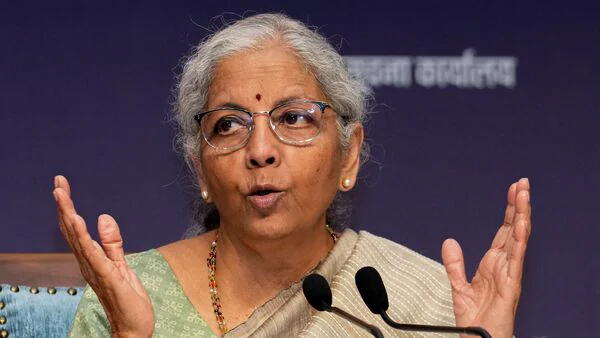
Sitharaman Calls For India-Centric Economic Models
The methodology for studying the economy must evolve, said Sitharaman, describing technology as the fifth factor of production.“Without technology, land, labour, and capital will remain where they are. Economies that adopt it across sectors progress faster, while those that limit its reach lag behind,” she said, speaking at an event at the Delhi School of Economics (DSE).
Also Read | Unions against any new plans for public sector bank consolidation“India stands together today and stands tall and stands distinctly on its feet because of the economic strength of India,” she said, noting that the country has moved from being the 10th largest economy in 2014 to the 5th today, and“soon, probably to the 3rd.”
Sitharaman underscored the importance of objective, data-led analysis and urged economists to“read data, read between the data, and talk for India.”
Bridging a gapInstitutions like DSE, she said, should bridge the gap between research and governance, producing insights that directly inform policymaking.
“Many international economic theories are Western-centric,” she said.“We need India-centric models that can also serve the global South.”
The minister urged the Delhi School of Economics to train economists and policymakers in advanced data analytics and artificial intelligence to improve early economic warning systems, policy design, and governance outcomes. She also encouraged a multidisciplinary approach that blends economics with data science, environmental studies, and public policy.
Also Read | Despite slow disbursals, Centre eyes bigger push for state capex in FY27Sitharaman said DSE should anchor field immersion programmes that expose students to ground realities by engaging with districts, small businesses, self-help groups, and cooperatives. Such initiatives, she said, will help create“economists with empathy, who understand both the numbers and the minds of the people”.
Calling for deeper India-centric research, Sitharaman urged the institution to focus on subjects such as fiscal federalism, goods and services tax reforms, financial inclusion, employment elasticity, and climate finance, while also assisting state governments in policy formulation.
Also Read | MoSPI proposes changes to India's housing inflation measurement Legal Disclaimer:
MENAFN provides the
information “as is” without warranty of any kind. We do not accept
any responsibility or liability for the accuracy, content, images,
videos, licenses, completeness, legality, or reliability of the information
contained in this article. If you have any complaints or copyright
issues related to this article, kindly contact the provider above.


















Comments
No comment